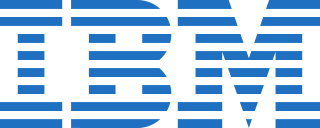
Db2 is a family of data management products, including database servers, developed by IBM. It initially supported the relational model, but was extended to support object–relational features and non-relational structures like JSON and XML. The product name was originally styled as DB2 until 2017, when it changed to its present form.

A chatbot is a software application or web interface that is designed to mimic human conversation through text or voice interactions. Modern chatbots are typically online and use generative artificial intelligence systems that are capable of maintaining a conversation with a user in natural language and simulating the way a human would behave as a conversational partner. Such chatbots often use deep learning and natural language processing, but simpler chatbots have existed for decades.

SAS is a statistical software suite developed by SAS Institute for data management, advanced analytics, multivariate analysis, business intelligence, criminal investigation, and predictive analytics. SAS' analytical software is built upon artificial intelligence and utilizes machine learning, deep learning and generative AI to manage and model data. The software is widely used in industries such as finance, insurance, health care and education.
Data virtualization is an approach to data management that allows an application to retrieve and manipulate data without requiring technical details about the data, such as how it is formatted at source, or where it is physically located, and can provide a single customer view of the overall data.

ServiceNow, Inc. is an American software company based in Santa Clara, California, that develops a cloud computing platform to help companies manage digital workflows for enterprise operations. Founded in 2003 by Fred Luddy, ServiceNow is listed on the New York Stock Exchange and is a constituent of the Russell 1000 Index and S&P 500 Index. In 2018, Forbes magazine named it number one on its list of the world's most innovative companies.

Anaconda is a distribution of the Python and R programming languages for scientific computing, that aims to simplify package management and deployment. The distribution includes data-science packages suitable for Windows, Linux, and macOS. It is developed and maintained by Anaconda, Inc., which was founded by Peter Wang and Travis Oliphant in 2012. As an Anaconda, Inc. product, it is also known as Anaconda Distribution or Anaconda Individual Edition, while other products from the company are Anaconda Team Edition and Anaconda Enterprise Edition, neither of which are free.

Databricks, Inc. is a global data, analytics and artificial intelligence company founded by the original creators of Apache Spark.
Multimodal learning, in the context of machine learning, is a type of deep learning using a combination of various modalities of data, such as text, audio, or images, in order to create a more robust model of the real-world phenomena in question. In contrast, singular modal learning would analyze text or imaging data independently. Multimodal machine learning combines these fundamentally different statistical analyses using specialized modeling strategies and algorithms, resulting in a model that comes closer to representing the real world.
Instabase is a technology company headquartered in San Francisco. The company provides an applied AI platform that can be used to automate business processes.

Writer is a generative artificial intelligence company based in San Francisco, California that offers a full-stack generative AI platform for enterprises. In September 2023, Writer raised $100m in a Series B led by ICONIQ Growth with participation from Insight Partners, WndrCo, Balderton Capital, and Aspect Ventures. The co-founders of Writer also worked together on Qordoba, a previous startup.

ModelOps, as defined by Gartner, "is focused primarily on the governance and lifecycle management of a wide range of operationalized artificial intelligence (AI) and decision models, including machine learning, knowledge graphs, rules, optimization, linguistic and agent-based models". "ModelOps lies at the heart of any enterprise AI strategy". It orchestrates the model lifecycles of all models in production across the entire enterprise, from putting a model into production, then evaluating and updating the resulting application according to a set of governance rules, including both technical and business KPI's. It grants business domain experts the capability to evaluate AI models in production, independent of data scientists.
Prompt engineering is the process of structuring an instruction that can be interpreted and understood by a generative AI model. A prompt is natural language text describing the task that an AI should perform.

Generative pre-trained transformers (GPT) are a type of large language model (LLM) and a prominent framework for generative artificial intelligence. They are artificial neural networks that are used in natural language processing tasks. GPTs are based on the transformer architecture, pre-trained on large data sets of unlabelled text, and able to generate novel human-like content. As of 2023, most LLMs have these characteristics and are sometimes referred to broadly as GPTs.

GPT-J or GPT-J-6B is an open-source large language model (LLM) developed by EleutherAI in 2021. As the name suggests, it is a generative pre-trained transformer model designed to produce human-like text that continues from a prompt. The optional "6B" in the name refers to the fact that it has 6 billion parameters.
A large language model (LLM) is a computational model notable for its ability to achieve general-purpose language generation and other natural language processing tasks such as classification. Based on language models, LLMs acquire these abilities by learning statistical relationships from text documents during a computationally intensive self-supervised and semi-supervised training process. LLMs can be used for text generation, a form of generative AI, by taking an input text and repeatedly predicting the next token or word.
In deep learning, fine-tuning is an approach to transfer learning in which the parameters of a pre-trained model are trained on new data. Fine-tuning can be done on the entire neural network, or on only a subset of its layers, in which case the layers that are not being fine-tuned are "frozen". A model may also be augmented with "adapters" that consist of far fewer parameters than the original model, and fine-tuned in a parameter–efficient way by tuning the weights of the adapters and leaving the rest of the model's weights frozen.
Aleph Alpha is an independent German artificial intelligence (AI) startup company in Heidelberg, founded by professionals with experience as employees of Apple, SAP and Deloitte. Aleph Alpha attempts to provide a full-stack souvereign technology stack for generative AI, independent from US companies and comply with European data protection regulations and the AI Act. It built one of the most powerful AI clusters inside its own data centre and develops large language models (LLM), which try to provide transparency of its sources used for the results generated and are intended for enterprises and governmental agencies only. Training of its model has been done in five European languages.
Claude is a family of large language models developed by Anthropic. The first model was released in March 2023. Claude 3, released in March 2024, can also analyze images.
IBM Granite is a series of decoder-only foundation models created by IBM. It was announced on September 7, 2023, and an initial paper was published 4 days later. Initially intended for use in the IBM's cloud-based data and generative AI platform Watsonx along with other models, IBM opened the source code of some code models. Granite models are trained on datasets curated from Internet, academic publishings, code datasets, legal and finance documents.
IBM Think is an annual business conference organized by IBM. Before 2018, IBM held similar business conferences under different names. Think is seen as a successor to World of Watson that was held in 2017. The conference name is a reference the 'Think' slogan used by IBM.









